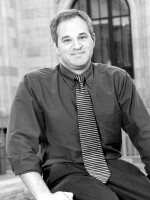STEVE INSKEEP, host:
Now, today, the president holds a pair of town hall meetings on health care. He talks with voters in Raleigh, North Carolina, where he did well in the election, and also in Bristol, Virginia, where he did not. NPR's Adam Hochberg reports.
ADAM HOCHBERG: The neighboring communities of Bristol, Virginia and Bristol, Tennessee are known for their mountain scenery, their country music heritage and their conservative politics. In this corner of the Appalachians, President Obama barely managed 30 percent of the vote against John McCain, and now his health care proposal is being met with skepticism.
Sarah Jane Walls owns a fashion boutique on Bristol's State Street, a downtown thoroughfare that forms the state line between Tennessee and Virginia. With just two part-time employees, Walls doesn't offer health benefits, and nothing the president has proposed would force her to. Still, she worries the plan will increase her costs and worsen medical care.
Ms. SARAH JANE WALLS (Fashion Boutique Owner): We, as Americans, do have a great health care system. Yes, there are some things that need to be addressed, but as far as entire reform goes, with a lot of government control, I don't think that needs to happen.
HOCHBERG: Walls, a Bristol native, says many people here share her fear that the president wants the government to take over health care. It's a concern Mr. Obama repeatedly has tried to dispel and one he's likely to address again today when he holds his town meeting at this Kroger supermarket.
(Soundbite of woman speaking over PA)
HOCHBERG: Yesterday, as workers tidied up the store, floral department employee Vera Lewis(ph) wore an Obama/Biden button on her vest. Lewis is the store's union shop steward and says she's optimistic the president's message will win him support in this area where about 15 percent of the population is uninsured.
Ms. VERA LEWIS: My mother's one of them. You know, she's been laid off from her job - been off for years - can't go to the doctor. She can't afford medicine. And we have a lot of shoppers that come in here that are in the same boat.
HOCHBERG: Today, the store's 70 or so employees will make up the audience for the town hall. Most are hourly workers - some full-time, some part-time. They're eligible for health insurance through their jobs, and University of Virginia political scientist, Larry Sabato, says Mr. Obama needs to persuade them that his plan would leave them better off.
Professor LARRY SABATO (Political Science, University of Virginia): Unless Obama and the Democrats can get more support for the health care reform plan from whites - middle-class whites in particular - I doubt they're going to get the whole enchilada.
HOCHBERG: Indeed, even some Bristol residents who are struggling with health costs aren't embracing the president's proposal. Yesterday, at the Burger Bar, a downtown diner, Richie Drake was eating a late breakfast. Drake's unemployed - disabled from his job as a sheet rock installer; his children are on Medicaid. But he wants no part of the president's reforms.
Mr. RICHIE DRAKE: The health care plan he's got, Obama, is going to hurt people in the long run. Minorities are going to get more attention than the whites and stuff like that. That's the way I take it from what the news was talking about.
HOCHBERG: Only one Burger Bar customer we spoke with gave the president's proposal a strong endorsement. College Professor Randy Smith said health care reforms are long overdue.
Professor RANDY SMITH: I'm like everyone. I think I have concerns when you look at the amount of debt that we're building up. But just to do nothing, as the president, I think, has correctly said, is not going to dig us out of the hole.
HOCHBERG: Smith says the health care needs of Appalachia are obvious. Just this weekend in a nearby county, almost 3,000 people showed up for a free medical clinic - some lined up for days to get treatment. Still, even if few people here would deny there's a problem, Smith questions whether President Obama can sell the idea that the federal government can be part of the solution.
Adam Hochberg, NPR News, Bristol, Virginia.
(Soundbite of blues music)
INSKEEP: Broadcasting from Washington, Afghanistan and around the country, this is NPR News. Transcript provided by NPR, Copyright NPR.
NPR transcripts are created on a rush deadline by an NPR contractor. This text may not be in its final form and may be updated or revised in the future. Accuracy and availability may vary. The authoritative record of NPR’s programming is the audio record.

